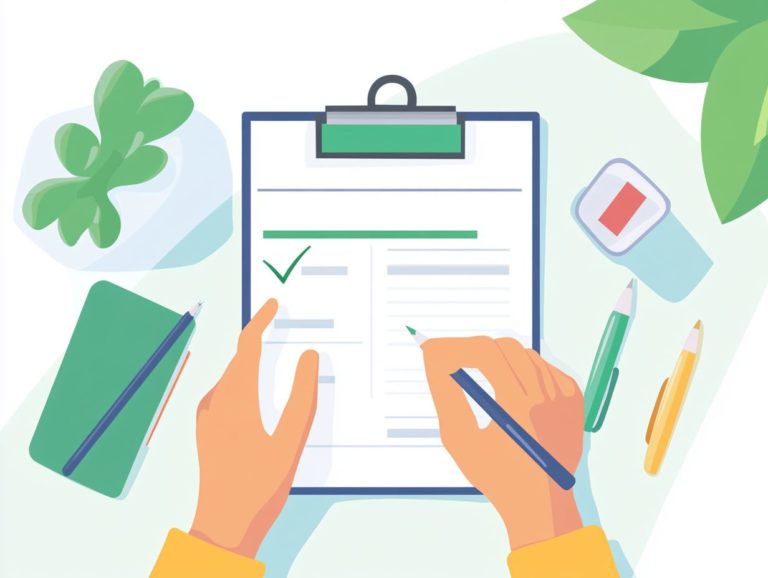5 Educational Certifications for Special Education Teachers
Understanding the world of special education offers both rewarding opportunities and significant challenges. For educators who wish to improve their skills and support diverse learners, obtaining specialized certifications is a valuable investment.
This article explores five important certifications, from Special Education Certification to Autism Spectrum Disorder Certification, detailing their requirements, benefits, and their positive impact on your teaching career.
You will also learn how to keep these credentials updated and the challenges that may arise along the way. Let s dive into the exciting world of special education certifications!
Contents
- Key Takeaways:
- 1. Special Education Certification
- 2. Early Childhood Special Education Certification
- 3. Autism Spectrum Disorder Certification
- 4. Behavior Intervention Certification
- 5. Assistive Technology Certification
- What Are the Requirements for Obtaining These Certifications?
- What Are the Benefits of Having These Certifications?
- How Can These Certifications Help Special Education Teachers in Their Career?
- What Are the Different Types of Special Education Certifications Available?
- How Can Teachers Stay Updated and Maintain Their Certifications?
- What Are the Challenges of Obtaining and Maintaining These Certifications?
- Frequently Asked Questions
- What are the 5 educational certifications for special education teachers?
- Can I work as a special education teacher without these certifications?
- What is the Special Education Certificate?
- How do I become board certified in special education?
- What is the Early Childhood Special Education Certificate?
- Is the Autism Certification required for special education teachers?
Key Takeaways:
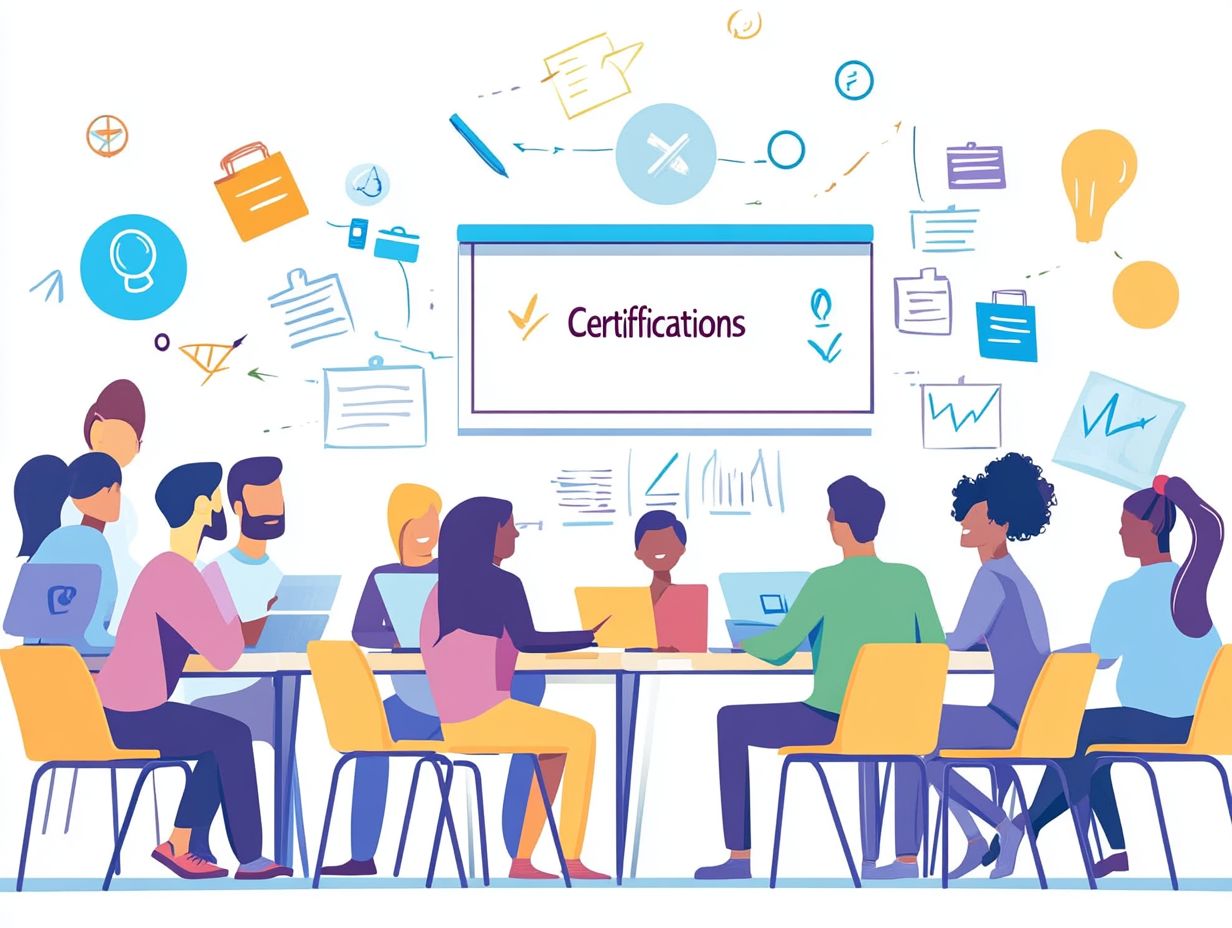
Special education teachers can greatly enhance their skills with certifications in areas like early childhood, autism, behavior intervention, and assistive technology. These credentials empower teachers to better support their students. It s crucial to continue your education to maintain these certifications and stay current in the special education field.
1. Special Education Certification
Special Education Certification is an essential credential for educators dedicated to providing quality educational services to children with special needs, especially those on the autism spectrum. This certification maintains high professional standards and boosts your marketability in a competitive job market.
Getting this certification requires more than just completing paperwork; it involves earning a master s degree, highlighting the advanced knowledge needed to support diverse learners effectively. As a member of the National Association of Special Education Teachers (NASET), you gain access to valuable resources and networking opportunities to help you navigate the challenges of special education.
Using proven methods is crucial in this field, ensuring you employ effective strategies that promote student success. Ultimately, achieving this certification strengthens your job security and often leads to higher salaries, rewarding you for your specialized expertise and commitment.
2. Early Childhood Special Education Certification
The Early Childhood Special Education Certification provides you with the specific skills needed to support young children with autism spectrum disorder and other developmental delays effectively.
This certification requires meeting particular educational and practical training standards, allowing you to adjust your teaching methods to fit diverse needs.
By mastering individualized instruction and behavioral interventions, you ll be prepared to create inclusive classrooms. This certification enhances your teaching opportunities and significantly improves the educational experiences of young learners by implementing tailored strategies.
Obtaining this certification is vital as it helps develop effective learning plans, leading to better outcomes for young children with special needs.
3. Autism Spectrum Disorder Certification
The Autism Spectrum Disorder Certification is designed for professionals like you who aim to become Certified Autism Specialists. This certification allows you to implement effective, proven practices in managing autism spectrum disorders.
To earn this respected certification, you must meet certain requirements, including relevant educational qualifications and hands-on experience with individuals on the spectrum. Understanding the IBCCES Code of Ethics is essential, as it helps you make ethical decisions to provide the best possible service.
By developing specialized skills through this certification, you not only elevate your own expertise but also enhance educational services for students with autism, creating an inclusive environment that meets diverse learning needs.
4. Behavior Intervention Certification
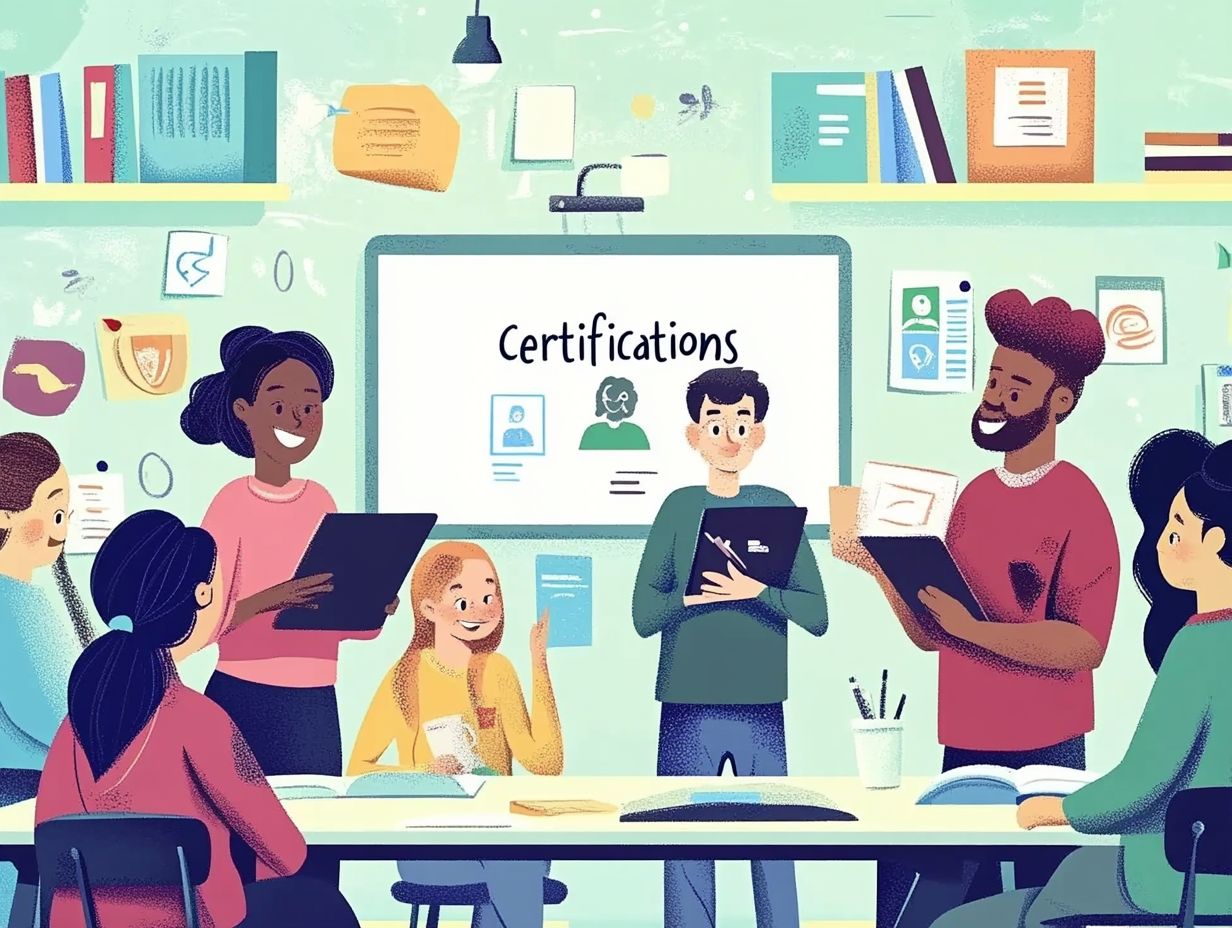
Behavior Intervention Certification focuses on proven methods for behavior management. It equips you with specialized skills to effectively support students who exhibit challenging behaviors.
This certification sharpens your expertise and aligns with professional development standards that promote continuous learning and the use of effective techniques across various educational settings.
As a certified professional who helps manage student behavior, your role is crucial. You lead the implementation and evaluation of behavior intervention strategies tailored to each student s unique needs.
By fostering a proactive environment where these strategies thrive, you encourage positive behavioral changes that enhance academic and social outcomes for all students.
5. Assistive Technology Certification
Assistive Technology Certification empowers you as a special education professional to effectively use educational technology and assistive tools. This enriches the learning experience for students with diverse needs.
This vital training equips you with the knowledge to seamlessly integrate innovative tools and develops specialized skills essential for creating tailored learning experiences.
By understanding the range of available assistive technologies, you can make informed decisions that boost student engagement and accessibility.
Obtaining this certification meets the continuing education unit requirements necessary for professionals in your field. This ensures you stay updated on the latest advancements.
This ongoing education fosters inclusive environments that cater to each student’s unique needs, paving the way for their academic success.
What Are the Requirements for Obtaining These Certifications?
To obtain certifications in special education, such as the Autism Spectrum Disorder Certification and the Early Childhood Special Education Certification, you must meet specific criteria. This typically includes holding a master’s degree and relevant teaching experience.
In addition to the degree, you need to complete a set number of supervised classroom hours to gain essential hands-on experience in various educational environments. This practical exposure is crucial as it equips you with the skills to meet the needs of students with disabilities.
Many certification processes also require passing standardized exams that evaluate your understanding of special education laws, teaching strategies, and developmental psychology. You must focus on meeting these initial requirements and engage in continuous professional development to stay informed about best practices in the field.
What Are the Benefits of Having These Certifications?
Holding specialized certifications in special education offers numerous advantages, including higher salaries, increased job security, and enhanced marketability in a competitive job market. This demonstrates your commitment to autism advocacy and high-quality education.
These credentials not only equip you with essential skills and knowledge but also significantly elevate your professional profile, making you more attractive to potential employers.
As organizations increasingly prioritize inclusion and diversity, your expertise as a well-trained specialist can improve educational outcomes for students with autism, creating a more enriching learning environment.
Additionally, holding these certifications can lead to leadership opportunities, professional development, and valuable networking connections, allowing you to have a greater impact in your field.
Invest in these qualifications to show your commitment to advancing educational standards and supporting individuals with diverse learning needs.
How Can These Certifications Help Special Education Teachers in Their Career?
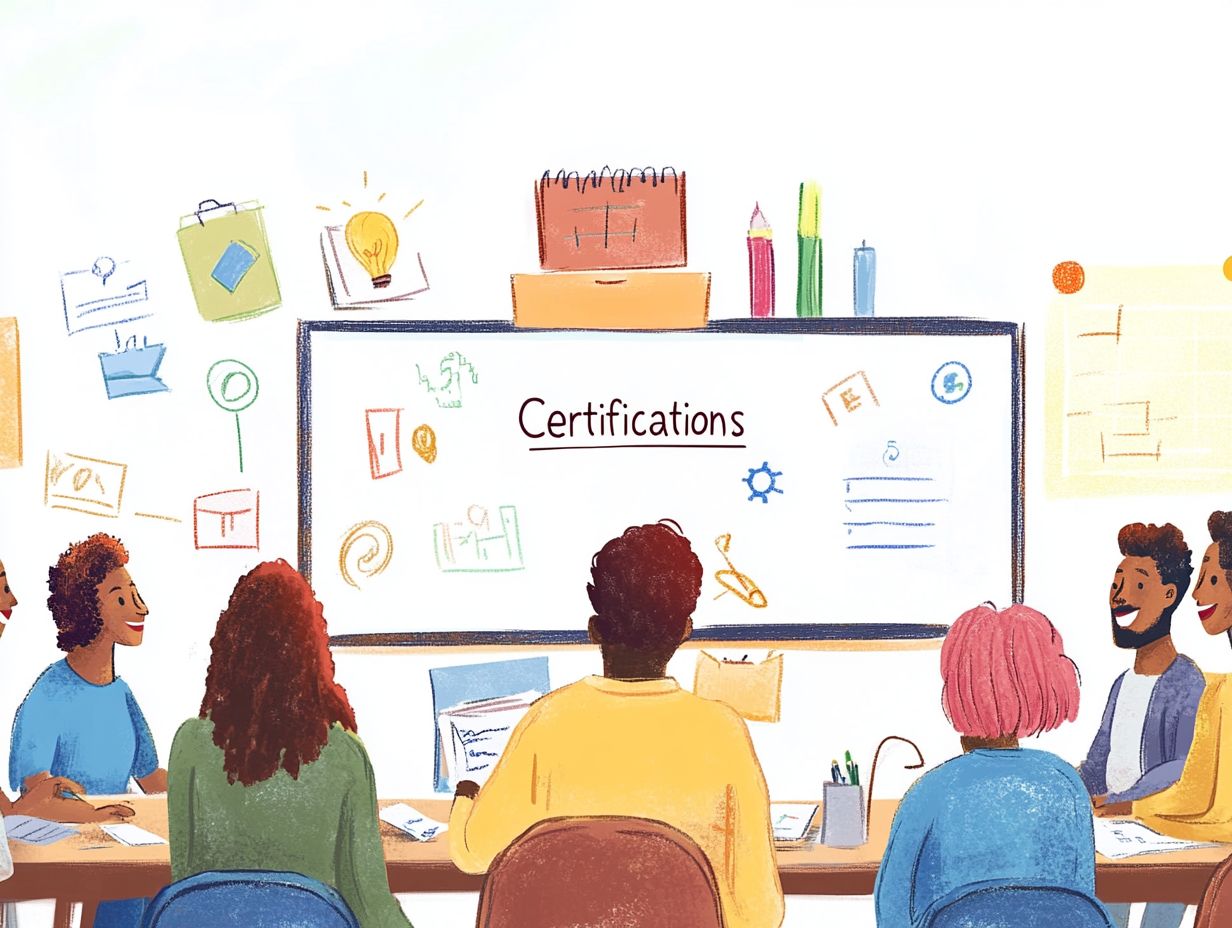
Certifications can significantly elevate your career as a special education teacher. They equip you with specialized skills that enhance your competitiveness in the job market. Exploring 5 popular certifications for educational administrators can streamline your job hunting process and pave the way for career advancement.
These credentials prove your expertise. They equip you with innovative teaching strategies tailored for diverse learners. Presenting your specialized training during job interviews demonstrates your commitment to ongoing professional growth, helping you stand out from the crowd.
This knowledge boosts your confidence, enabling you to engage more effectively with students, colleagues, and parents. As a result, you find yourself in a stronger position to make meaningful contributions in your role, further solidifying your impact within the academic community.
What Are the Different Types of Special Education Certifications Available?
You ll discover a range of special education certifications available to enhance your expertise, including:
- Autism Spectrum Disorder Certification
- Early Childhood Special Education Certification
- Behavior Intervention Certification
Each certification is tailored to address specific skills and educational needs. This ensures you have the tools to support diverse learners effectively.
For example, the Autism Spectrum Disorder Certification delves into the intricacies of autism. It provides you with strategies for implementing personalized interventions. Meanwhile, the Early Childhood Special Education Certification emphasizes developmental milestones and inclusive practices for young children. Similarly, the Behavior Intervention Certification equips you with proven methods to manage and modify challenging behaviors.
As a special education professional, you can tap into a wealth of resources through online courses, workshops, and collaborative networks. These opportunities not only enhance your practical skills but also keep you informed on best practices in this ever-evolving field.
How Can Teachers Stay Updated and Maintain Their Certifications?
To maintain your certifications, engage in continuous professional development and complete the required continuing education units. This ensures you stay updated with the latest evidence-based practices and standards in special education.
Your commitment to lifelong learning can take various forms. Participate in targeted workshops that offer hands-on experience, or enroll in online courses that provide the flexibility your busy schedule demands.
By actively seeking these professional development opportunities, you enhance your skills and contribute to a vibrant learning community. Staying current with educational trends is vital. It enables you to implement innovative techniques that can significantly impact student outcomes.
Such efforts foster a culture of collaboration and knowledge sharing among your peers, enriching the educational experience for everyone involved.
What Are the Challenges of Obtaining and Maintaining These Certifications?
Obtaining and maintaining special education certifications can be a formidable challenge. The rigorous certification requirements demand teaching experience and a significant commitment to honing specialized skills.
You often find yourself balancing a multitude of responsibilities managing the classroom, crafting engaging lesson plans, and keeping up with the latest pedagogical techniques.
The competitive job market adds another layer of pressure; it s not enough to simply be certified. You must continually enhance your skill set to truly stand out among your peers.
Pursuing professional development takes time and resources. Make sure to prioritize it in your busy schedule!
As you work to meet these demanding requirements, you may encounter stress and burnout. This underscores the pressing need for supportive structures within schools to aid in your journey.
Frequently Asked Questions
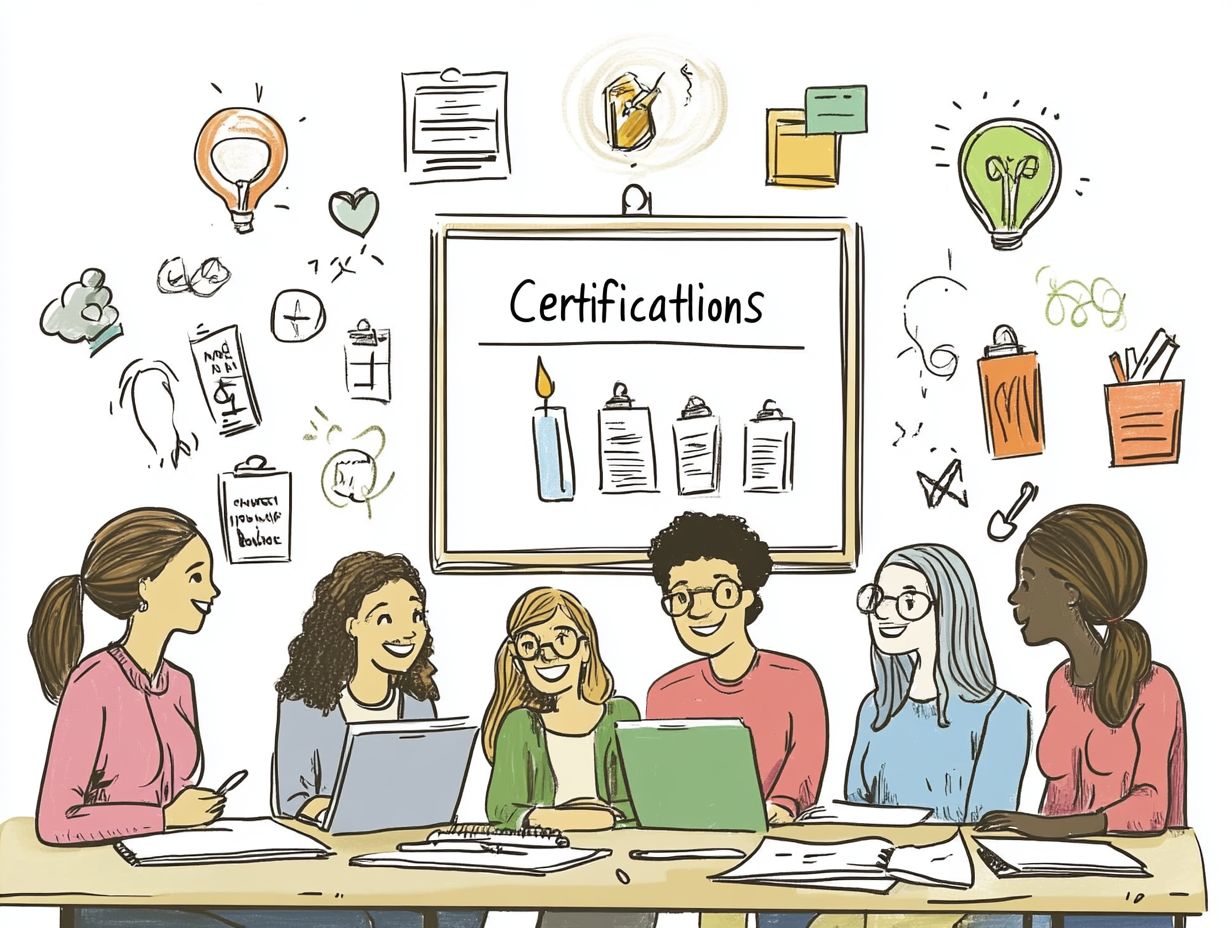
Ready to enhance your skills? Explore certification options today!
What are the 5 educational certifications for special education teachers?
The 5 educational certifications for special education teachers are:
- Special Education Certificate
- Board Certification in Special Education
- Early Childhood Special Education Certificate
- Autism Certification
- Assistive Technology Certificate
These certifications enhance a teacher’s ability to make a difference in students’ lives.
Can I work as a special education teacher without these certifications?
It depends on the state and school district you are working in. Some may require specific certifications for special education teachers, while others have more flexible requirements.
What is the Special Education Certificate?
The Special Education Certificate prepares teachers to work with students with different disabilities, such as learning disabilities, behavioral disorders, and physical disabilities.
This certification is often necessary for special education teaching positions in public schools.
How do I become board certified in special education?
To become board certified in special education, you must meet certain education and experience requirements, pass a certification exam, and complete additional classes that keep teachers up-to-date.
The National Board for Professional Teaching Standards offers this certification for eligible teachers.
What is the Early Childhood Special Education Certificate?
The Early Childhood Special Education Certificate is for teachers who work with young children with special needs, typically from birth to age 5.
This certification helps teachers address the unique developmental and educational needs of young children with disabilities.
Is the Autism Certification required for special education teachers?
The Autism Certification is not always required for special education teachers. The Autism Certification can be a valuable asset for those working specifically with students on the autism spectrum, enhancing their knowledge and skills in this area.

